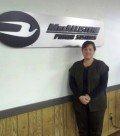 When looking for a job, it’s easy to overlook the benefits of working for a staffing agency. In fact, companies like Express Employment Professionals can help change lives in the midst of economic uncertainty and provide job opportunities for some of the most hardworking individuals around.
When looking for a job, it’s easy to overlook the benefits of working for a staffing agency. In fact, companies like Express Employment Professionals can help change lives in the midst of economic uncertainty and provide job opportunities for some of the most hardworking individuals around.
Express takes pride in the accomplishments of those individuals who come to us for work. Without the skills and talents of our associates who provide what companies are looking for, Express wouldn’t be what it is today.
To help recognize outstanding associates and their dedication to Express and the companies they work for, we would like to showcase select associates each month on Movin’ On Up. It’s important to give credit where credit is due, and Express would like to share stories of our associates as an inspiration to you while you strive to achieve professional success.
Erin Wharton
Erin found her current job through the South Indianapolis office in Greenwood, Ind. She came to Express after a rough job search. She spent 14 years with a previous employer in a less-than-constructive work environment. She left in hopes of finding a better place to work, but ended up facing a fiercely competitive job market, sending countless résumés and submitting numerous job applications for weeks with no response.
Fearing the worst, she noticed a job posting for an administrative position through Express. She had no previous experience dealing with staffing companies like Express and was a little cautious about calling to apply, but ended up emailing her résumé and application anyway. Within a couple of days, she was called by Michelle Bright from the Greenwood office for an interview.
“During the phone call, Michelle made me feel comfortable, confident, and helped ease what little fear I had.” Erin said.
When Erin came to the Express office for an interview, her anxiety returned until she met someone in the waiting room who had been working for Express for a few years. The woman told Erin that Express was “great to work with,” and “you’re working with the best.” When Erin sat down for the interview with Express, she was almost immediately told that there was a perfect position for her. After interviewing with McAllister Power on a Friday morning, she was offered a job to start the next Monday.
“Working with Express was by far the best choice I have made. I have even referred people to them. You don’t know how good it feels to be happy, enjoy getting up in the morning and coming to work. I look forward to the next day and what it is going to bring. Every day is something new. The employees here at MacAllister are absolutely wonderful,” Erin said.
We’re excited to have Erin as a part of our Express family. If you haven’t already considered looking into working with a staffing agency like Express, give it a try. You could find the same success that Erin did.
“I owe my happiness and my life to Michelle for matching me with the perfect company. I give everyone at Express my sincere gratitude!”




